- Home
- Samuel Beckett
Watt Page 3
Watt Read online
Page 3
1975
Spring Directs Godot in Berlin and Pas moi (translation of Not I) in Paris.
1976
February Pour finir encore et autres foirades (Paris: Minuit).
20 May Directs Billie Whitelaw in Footfalls, which is performed with That Time at London’s Royal Court Theatre in honour of Beckett’s seventieth birthday.
Autumn All Strange Away, illustrated with etchings by Edward Gorey (New York: Gotham Book Mart).
Foirades/Fizzles, in French and English, illustrated with etchings by Jasper Johns (New York: Petersburg Press).
December Footfalls (London: Faber).
1977
March Collected Poems in English and French (London: Calder; New York: Grove).
1978
May Pas, translation of Footfalls (Paris: Minuit).
August Poèmes, suivi de mirlitonnades (Paris: Minuit).
1980
January Compagnie (Paris: Minuit).
Company (London: Calder).
May Directs Endgame in London with Rick Cluchey and the San Quentin Drama Workshop.
1981
March Mal vu mal dit (Paris: Minuit).
April Rockaby and Other Short Pieces (New York: Grove).
October Ill Seen Ill Said, translation of Mal vu mal dit (New York: The New Yorker, Grove).
1983
April Worstward Ho (London: Calder).
September Disjecta: Miscellaneous Writings and a Dramatic Fragment, containing critical essays on art and literature as well as the unfinished 1937 play Human Wishes (London: Calder).
1984
February Oversees San Quentin Drama Workshop production of Godot, directed by Walter Asmus, in London.
Collected Shorter Plays (London: Faber; New York: Grove).
May Collected Poems 1930–1978 (London: Calder).
July Collected Shorter Prose 1945–1980 (London: Calder).
1989
April Stirrings Still (New York: Blue Moon Books).
June Nohow On: Company, Ill Seen Ill Said, Worstward Ho, illustrated with etchings by Robert Ryman (New York: Limited Editions Club).
July 17 Death of Suzanne Beckett.
December 22 Death of Samuel Beckett. Burial in Cimetière de Montparnasse.
1990
As the Story Was Told: Uncollected and Late Prose (London: Calder; New York: Riverrun Press).
1992
Dream of Fair to Middling Women (Dublin: Black Cat Press).
1995
Eleutheria (Paris: Minuit).
1996
Eleutheria, translated into English by Barbara Wright (London: Faber).
1998
No Author Better Served: The Correspondence of Samuel Beckett and Alan Schneider, edited by Maurice Harmon (Cambridge: Harvard University Press).
2000
Beckett on Film: nineteen films, by different directors, of Beckett’s works for the stage (RTÉ, Channel 4, and Irish Film Board; DVD, London: Clarence Pictures).
2006
Samuel Beckett: Works for Radio: The Original Broadcasts: five works spanning the period 1957–1976 (CD, London: British Library Board).
Compiled by Cassandra Nelson
From the Watt notebooks
Courtesy of Harry Ransom Humanities Research Center, The University of
Texas at Austin. © The Estate of Samuel Beckett.
Watt
I
Mr Hackett turned the corner and saw, in the failing light, at some little distance, his seat. It seemed to be occupied. This seat, the property very likely of the municipality, or of the public, was of course not his, but he thought of it as his. This was Mr Hackett’s attitude towards things that pleased him. He knew they were not his, but he thought of them as his. He knew they were not his, because they pleased him.
Halting, he looked at the seat with greater care. Yes, it was not vacant. Mr Hackett saw things a little more clearly when he was still. His walk was a very agitated walk.
Mr Hackett did not know whether he should go on, or whether he should turn back. Space was open on his right hand, and on his left hand, but he knew that he would never take advantage of this. He knew also that he would not long remain motionless, for the state of his health rendered this unfortunately impossible. The dilemma was thus of extreme simplicity: to go on, or to turn, and return, round the corner, the way he had come. Was he, in other words, to go home at once, or was he to remain out a little longer?
Stretching out his left hand, he fastened it round a rail. This permitted him to strike his stick against the pavement. The feel, in his palm, of the thudding rubber appeased him, slightly.
But he had not reached the corner when he turned again and hastened towards the seat, as fast as his legs could carry him. When he was so near the seat, that he could have touched it with his stick, if he had wished, he again halted and examined its occupants. He had the right, he supposed, to stand and wait for the tram. They too were perhaps waiting for the tram, for a tram, for many trams stopped here, when requested, from without or within, to do so.
Mr Hackett decided, after some moments, that if they were waiting for a tram they had been doing so for some time. For the lady held the gentleman by the ears, and the gentleman’s hand was on the lady’s thigh, and the lady’s tongue was in the gentleman’s mouth. Tired of waiting for the tram, said1 Mr Hackett, they strike up an acquaintance. The lady now removing her tongue from the gentleman’s mouth, he put his into hers. Fair do, said Mr Hackett. Taking a pace forward, to satisfy himself that the gentleman’s other hand was not going to waste, Mr Hackett was shocked to find it limply dangling over the back of the seat, with between its fingers the spent three quarters of a cigarette.
I see no indecency, said the policeman.
We arrive too late, said Mr Hackett. What a shame.
Do you take me for a fool? said the policeman.
Mr Hackett recoiled a step, forced back his head until he thought his throatskin would burst, and saw at last, afar, bent angrily upon him, the red violent face.
Officer, he cried, as God is my witness, he had his hand upon it.
God is a witness that cannot be sworn.
If I interrupted your beat, said Mr Hackett, a thousand pardons. I did so with the best intentions, for you, for me, for the community at large.
The policeman replied briefly to this.
If you imagine that I have not your number, said Mr Hackett, you are mistaken. I may be infirm, but my sight is excellent. Mr Hackett sat down on the seat, still warm, from the loving. Good evening, and thank you, said Mr Hackett.
It was an old seat, low and worn. Mr Hackett’s nape rested against the solitary backboard, beneath it unimpeded his hunch protruded, his feet just touched the ground. At the ends of the long outspread arms the hands held the armrests, the stick hooked round his neck hung between his knees.
So from the shadows he watched the last trams pass, oh not the last, but almost, and in the sky, and in the still canal, the long greens and yellows of the summer evening.
But now a gentleman passing, with a lady on his arm, espied him.
Oh, my dear, he said, there is Hackett.
Hackett, said the lady. What Hackett? Where?
You know Hackett, said the gentleman. You must have often heard me speak of Hackett. Hunchy Hackett. On the seat.
The lady looked attentively at Mr Hackett.
So that is Hackett, she said.
Yes, said the gentleman.
Poor fellow, she said.
Oh, said the gentleman, let us now stop, do you mind, and wish him the time of evening. He advanced, exclaiming, My dear fellow, my dear fellow, how are you?
Mr Hackett raised his eyes, from the dying day.
My wife, cried the gentleman. Meet my wife. My wife. Mr Hackett.
I have heard so much about you, said the lady, and now I meet you, at last. Mr Hackett!
I do not rise, not having the force, said Mr Hackett.
Why I should think not i
ndeed, said the lady. She stooped towards him, quivering with solicitude. I should hope not indeed, she said.
Mr Hackett thought she was going to pat him on the head, or at least stroke his hunch. He called in his arms and they sat down beside him, the lady on the one side, and the gentleman on the other. As a result of this, Mr Hackett found himself between them. His head reached to the armpits. Their hands met above the hunch, on the backboard. They drooped with tenderness towards him.
You remember Grehan? said Mr Hackett.
The poisoner, said the gentleman.
The solicitor, said Mr Hackett.
I knew him slightly, said the gentleman. Six years, was it not.
Seven, said Mr Hackett. Six are rarely given.
He deserved ten, in my opinion, said the gentleman.
Or twelve, said Mr Hackett.
What did he do? said the lady.
Slightly overstepped his prerogatives, said the gentleman.
I received a letter from him this morning, said Mr Hackett.
Oh, said the gentleman, I did not know they might communicate with the outer world.
He is a solicitor, said Mr Hackett. He added, I am scarcely the outer world.
What rubbish, said the gentleman.
What nonsense, said the lady.
The letter contained an enclosure, said Mr Hackett, of which, knowing your love of literature, I would favour you with the primeur, if it were not too dark to see.
The primeur, said the lady.
That is what I said, said Mr Hackett.
I have a petrol-lighter, said the gentleman.
Mr Hackett drew a paper from his pocket and the gentleman lit his petrol-lighter.
Mr Hackett read:
TO NELLY
To Nelly, said the lady.
To Nelly, said Mr Hackett.
There was a silence.
Shall I continue? said Mr Hackett.
My mother’s name was Nelly, said the lady.
The name is not uncommon, said Mr Hackett, even I have known several Nellies.
Read on, my dear fellow, said the gentleman.
Mr Hackett read:
TO NELLY
To thee, sweet Nell, when shadows fall
Jug-jug! Jug-jug!
I here in thrall
My wanton thoughts do turn.
Walks she out yet with Byrne?
Moves Hyde his hand amid her skirts
As erst? I ask, and Echo answers: Certes.
Tis well! Tis well! Far, far be it
Pu-we! Pu-we!
From me, my tit,
Such innocent joys to chide.
Burn, burn with Byrne, from Hyde
Hide naught — hide naught save what
Is Greh’n’s. IT hide from Hyde, with Byrne burn not.
It! Peerless gage of maidenhood!
Cuckoo! Cuckoo!
Would that I could
Be certain in my mind
Upon discharge to find
Neath Cupid’s flow’r, hey nonny O!
Diana’s blushing bud in statu quo.
Then darkly kindle durst my soul
Tuwhit! Tuwhoo!
As on it stole
The murmur to become
Epithalamium,
And Hymen o’er my senses shed
The dewy forejoys of the marriage-bed.
Enough—
Ample, said the lady.
A woman in a shawl passed before them. Her belly could dimly be seen, sticking out, like a balloon.
I was never like that, my dear, said the lady, was I?
Not to my knowledge, my love, said the gentleman.
You remember the night that Larry was born, said the lady.
I do, said the gentleman.
How old is Larry now? said Mr Hackett.
How old is Larry, my dear? said the gentleman.
How old is Larry, said the lady. Larry will be forty years old next March, D.V.
That is the kind of thing Dee always vees, said Mr Hackett.
I wouldn’t go as far as that, said the gentleman.
Would you care to hear, Mr Hackett, said the lady, about the night that Larry was born?
Oh do tell him, my dear, said the gentleman.
Well, said the lady, that morning at breakfast Goff turns to me and he says, Tetty, he says, Tetty, my pet, I should very much like to invite Thompson, Cream and Colquhoun to help us eat the duck, if I felt sure you felt up to it. Why, my dear, says I, I never felt fitter in my life. Those were my words, were they not?
I believe they were, said Goff.
Well, said Tetty, when Thompson comes into the dining-room, followed by Cream and Berry (Colquhoun I remember had a previous engagement), I was already seated at the table. There was nothing strange in that, seeing I was the only lady present. You did not find that strange, did you, my love?
Certainly not, said Goff, most natural.
The first mouthful of duck had barely passed my lips, said Tetty, when Larry leaped in my wom.
Your what? said Mr Hackett.
My wom, said Tetty.
You know, said Goff, her woom.
How embarrassing for you, said Mr Hackett.
There were moments, I assure you, when I thought he would tumble out on the floor, at my feet.
Merciful heavens, you felt him slipping, said Mr Hackett.
No trace of this dollar appeared on my face, said Tetty. Did it, my dear?
Not a trace, said Goff.
Nor did my sense of humour desert me. What rolypoly, said Mr Berry, I remember, turning to me with a smile, what delicious rolypoly, it melts in the mouth. Not only in the mouth, sir, I replied, without an instant’s hesitation, not only in the mouth, my dear sir. Not too osy with the sweet, I thought.
Not too what? said Mr Hackett.
Osy, said Goff. You know, not too osy.
With the coffee and liquors, labour was in full swing, Mr Hackett, I give you my solemn word, under the groaning board.
Swing is the word, said Goff.
You knew she was pregnant, said Mr Hackett.
Why er, said Goff, you see er, I er, we er—
Tetty’s hand fell heartily on Mr Hackett’s thigh.
He thought I was coy, she cried. Hahahaha. Haha. Ha.
Haha, said Mr Hackett.
I was greatly worried I admit, said Goff.
Finally they retired, did you not? said Tetty.
We did indeed, said Goff, we retired to the billiard-room, for a game of slosh.
I went up those stairs, Mr Hackett, said Tetty, on my hands and knees, wringing the carpetrods as though they were made of raffia.
You were in such anguish, said Mr Hackett.
Three minutes later I was a mother.
Unassisted, said Goff.
I did everything with my own hands, said Tetty, everything.
She severed the cord with her teeth, said Goff, not having a scissors to her hand. What do you think of that?
I would have snapped it across my knee, if necessary, said Tetty.
That is a thing I often wondered, said Mr Hackett, what it feels like to have the string cut.
For the mother or the child? said Goff.
For the mother, said Mr Hackett. I was not found under a cabbage, I believe.
For the mother, said Tetty, the feeling is one of relief, of great relief, as when the guests depart. All my subsequent strings were severed by Professor Cooper, but the feeling was always the same, one of riddance.
Then you dressed and came downstairs, said Mr Hackett, leading the infant by the hand.
We heard the cries, said Goff.
Judge of their surprise, said Tetty.
Cream’s potting had been extraordinary, extraordinary, I remember, said Goff. I never saw anything like it. We were watching breathless, as he set himself for a long thin jenny, with the black of all balls.
What temerity, said Mr Hackett.
A quite impossible stroke, in my opinion, said Goff. He drew back
his queue to strike, when the wail was heard. He permitted himself an expression that I shall not repeat.
Poor little Larry, said Tetty, as though it were his fault.
Tell me no more, said Mr Hackett, it is useless.
These northwestern skies are really extraordinary, said Goff, are they not.
So voluptuous, said Tetty. You think it is all over and then pop! up they flare, with augmented radiance.
Yes, said Mr Hackett, there are protuberances and protuberances.
Poor Mr Hackett, said Tetty, poor dear Mr Hackett.
Yes, said Mr Hackett.
Nothing to the Glencullen Hacketts, I suppose, said Tetty.
It was there I fell off the ladder, said Mr Hackett.
What age were you then? said Tetty.
One, said Mr Hackett.
And where was your dear mother? said Tetty.
She was out somewhere, said Mr Hackett.
And your papa? said Tetty.
Papa was out breaking stones on Prince William’s Seat, said Mr Hackett.
You were all alone, said Tetty.
There was the goat, I am told, said Mr Hackett.
He turned away from the ladder fallen in the dark yard and his gaze moved down over the fields and the low tottering walls, across the stream and up the further slope to the bluff already in shadow, and the summer sky. He slipped down with the little sunlit fields, he toiled up with the foothills to the dark bluff, and he heard the distant clink of the hammers.
She left you all alone in the yard, said Tetty, with the goat.
It was a beautiful summer’s day, said Mr Hackett.
And what possessed her to slip off like that? said Goff.
I never asked her, said Mr Hackett. The pub, or the chapel, or both.
Poor woman, God forgive her, said Tetty.
Faith I wouldn’t put it past him, said Mr Hackett.
Night is now falling fast, said Goff, soon it will be quite dark.
Then we shall all go home, said Mr Hackett.
On the far side of the street, opposite to where they sat, a tram stopped. It remained stationary for some little time, and they heard the voice of the conductor, raised in anger. Then it moved on, disclosing, on the pavement, motionless, a solitary figure, lit less and less by the receding lights, until it was scarcely to be distinguished from the dim wall behind it. Tetty was not sure whether it was a man or a woman. Mr Hackett was not sure that it was not a parcel, a carpet for example, or a roll of tarpaulin, wrapped up in dark paper and tied about the middle with a cord. Goff rose, without a word, and rapidly crossed the street. Tetty and Mr Hackett could see his eager gestures, for his coat was light in colour, and hear his voice, raised in remonstrance. But Watt moved no more, as far as they could see, than if he had been of stone, and if he spoke he spoke so low that they did not hear him.

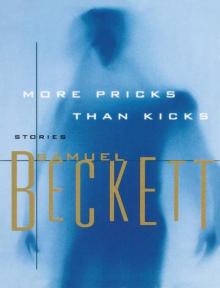 More Pricks Than Kicks
More Pricks Than Kicks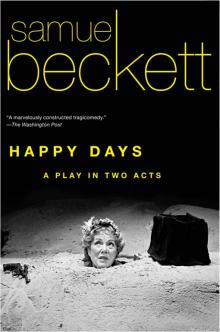 Happy Days
Happy Days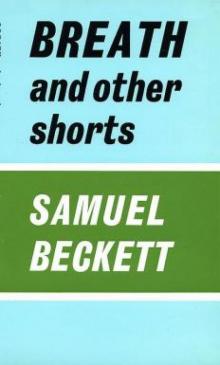 Breath, and Other Shorts
Breath, and Other Shorts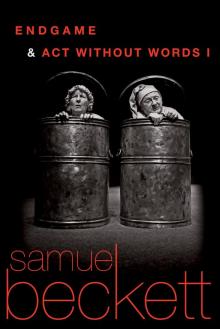 Endgame & Act Without Words
Endgame & Act Without Words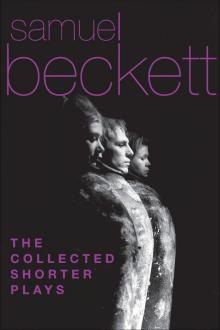 The Collected Shorter Plays of Samuel Beckett
The Collected Shorter Plays of Samuel Beckett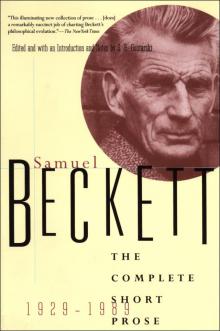 The Complete Short Prose, 1929-1989
The Complete Short Prose, 1929-1989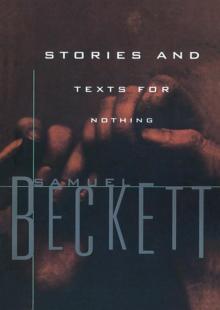 Stories and Texts for Nothing
Stories and Texts for Nothing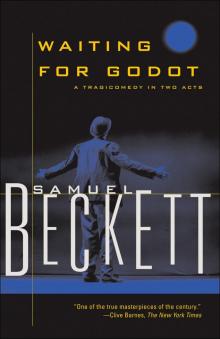 Waiting for Godot
Waiting for Godot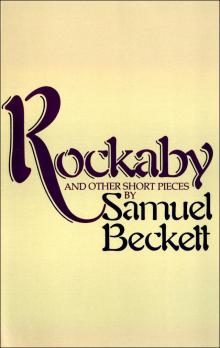 Rockaby and Other Short Pieces
Rockaby and Other Short Pieces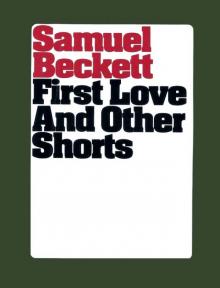 First Love and Other Shorts
First Love and Other Shorts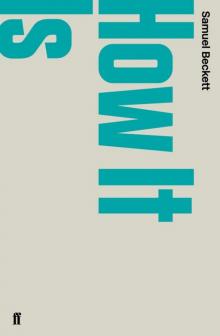 How It Is
How It Is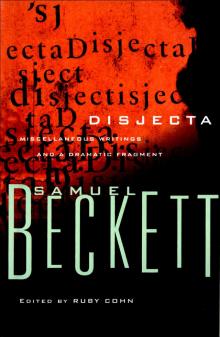 Disjecta: Miscellaneous Writings and a Dramatic Fragment
Disjecta: Miscellaneous Writings and a Dramatic Fragment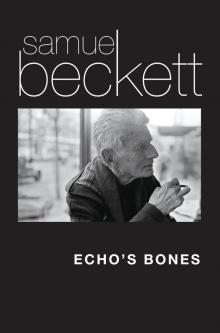 Echo's Bones
Echo's Bones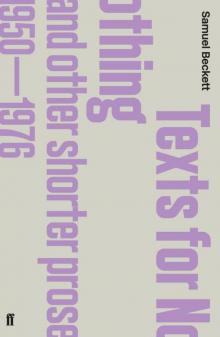 Texts for Nothing and Other Shorter Prose 1950-1976
Texts for Nothing and Other Shorter Prose 1950-1976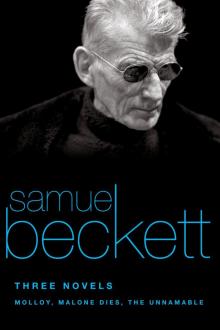 Three Novels
Three Novels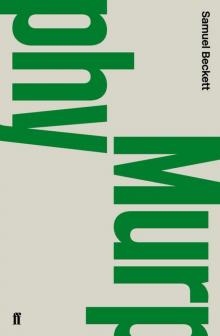 Murphy
Murphy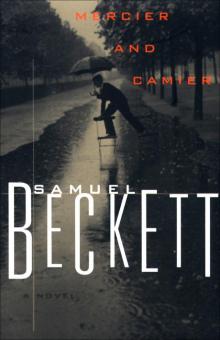 Mercier and Camier
Mercier and Camier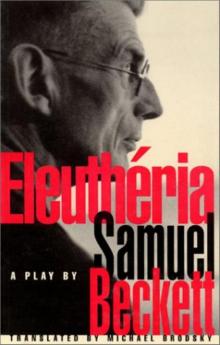 Eleuthéria
Eleuthéria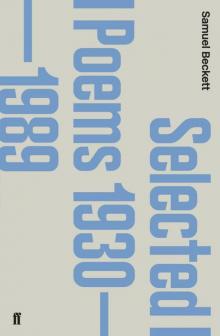 Selected Poems 1930-1988
Selected Poems 1930-1988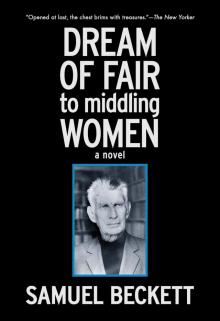 Dream of Fair to Middling Women
Dream of Fair to Middling Women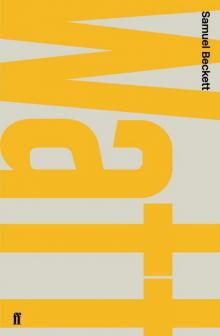 Watt
Watt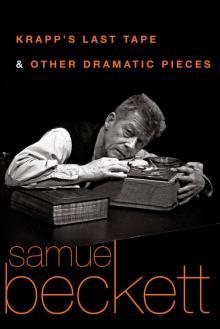 Krapp's Last Tape and Other Dramatic Pieces
Krapp's Last Tape and Other Dramatic Pieces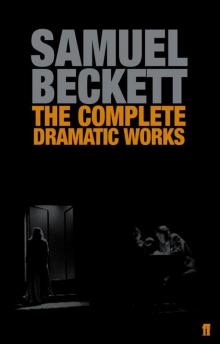 The Complete Dramatic Works of Samuel Beckett
The Complete Dramatic Works of Samuel Beckett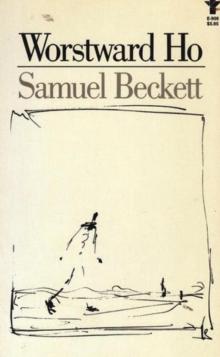 Worstward Ho
Worstward Ho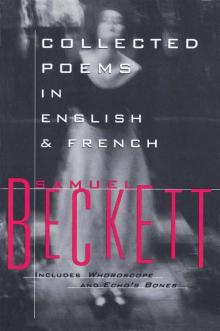 Collected Poems in English and French
Collected Poems in English and French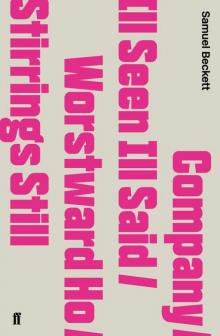 Company / Ill Seen Ill Said / Worstward Ho / Stirrings Still
Company / Ill Seen Ill Said / Worstward Ho / Stirrings Still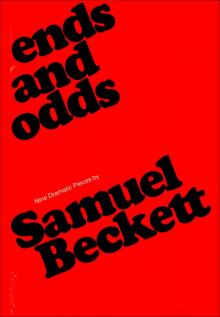 Ends and Odds
Ends and Odds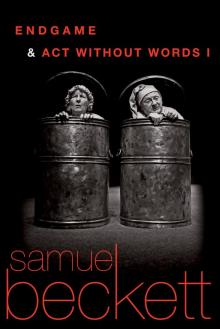 Endgame Act Without Words I
Endgame Act Without Words I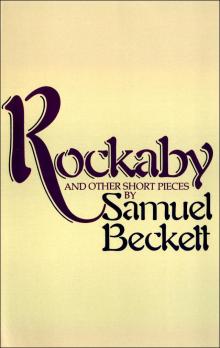 Rockabye and Other Short Pieces
Rockabye and Other Short Pieces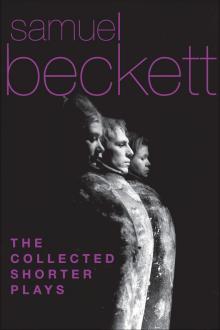 The Collected Shorter Plays
The Collected Shorter Plays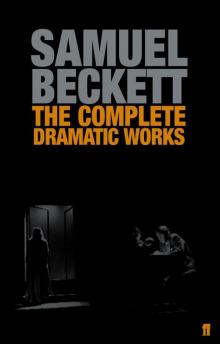 The Complete Dramatic Works
The Complete Dramatic Works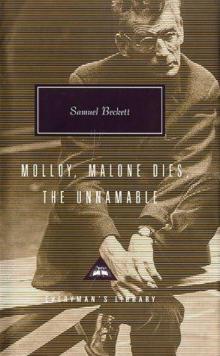 Three Novels: Malloy, Malone Dies, The Unnamable
Three Novels: Malloy, Malone Dies, The Unnamable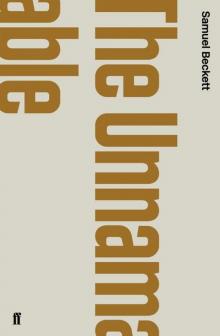 The Unnamable
The Unnamable